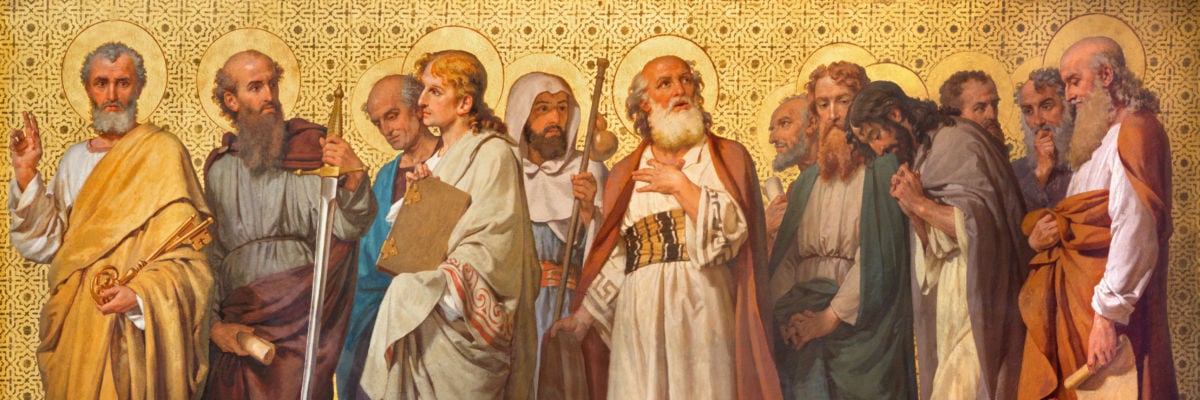
In a recent post we looked at the question of how many apostles there were.
The answer isn’t as simple as you might think. In addition to the original Twelve apostles, there was also Matthias, who replaced Judas as one of the Twelve, and Paul, who was never a member of the twelve.
Are there any other apostles who weren’t members of the Twelve?
There is at least one who is easy to name . . .
Barnabas
Paul and Barnabas are both set apart ministry together, on the instructions of the Holy Spirit, in Acts 13. The paralleling of the two suggests the two have the same office, and this is confirmed in the next chapter, as the men of Lystra attempt to worship them as gods. Luke reports:
But when the apostles Barnabas and Paul heard of it, they tore their garments and rushed out among the multitude, crying, “Men, why are you doing this? [Acts 14:14-15].
Here Barnabas is called an apostle. He is even mentioned before Paul (which is not unexpected; Barnabas was the more prominent figure early on). So we have at least one more apostle—besides Paul—who was not one of the Twelve.
Are there others?
Maybe Apostles: Silas and Timothy
It is argued that the New Testament refers to several additional individuals as apostles. Two of these are Silas and Timothy. They are listed, along with Paul, as joint-senders of 1 Thessalonians (see 1 Thess. 1:1). That doesn’t make them apostles, but later in the letter Paul is speaking of a time when he visited the church in Thessalonica, and he says:
For we never used either words of flattery, as you know, or a cloak for greed, as God is witness; nor did we seek glory from men, whether from you or from others, though we might have made demands as apostles of Christ [1 Thess. 2:5-6].
Since he uses the plural here—“we”—he may be including Silas and Timothy as fellow apostles. On the other hand, he may have slipped into a rhetorical “we” that does not mean to include Silas and Timothy.
A Maybe Apostle: Apollos
The same thing is true of Apollos. In 1 Corinthians Paul speaks of himself and two other ministers of Christ—Peter and Apollos—and subsequently says:
For I think that God has exhibited us apostles as last of all, like men sentenced to death, because we have become a spectacle to the world, to angels, and to men [1 Cor. 4:9].
Here he could be including Apollos among the apostles, but he may not be. He may be thinking of “us apostles” in a more general sense that refers to all the apostles and may not include Apollos.
The Thorny Case of James
In Galatians, Paul describes an occasion when he visited Jerusalem, and he writes:
Then after three years I went up to Jerusalem to visit Cephas, and remained with him fifteen days. But I saw none of the other apostles except James the Lord’s brother [Gal. 1:18-19].
This can naturally be read as placing James the Lord’s brother (also known as James the Just) among the apostles. Indeed, this would fit with the common to identification of this James with “James the son of Alphaeus” or “James the Less,” who was one of the Twelve apostles.
But there is reason to question that identification, as Pope Benedict XVI noted:
Among experts, the question of the identity of these two figures with the same name, James son of Alphaeus and James “the brother of the Lord,” is disputed. With reference to the period of Jesus’ earthly life, the Gospel traditions have not kept for us any account of either one of them [General Audience, June 28, 2006].
One reason for thinking that the two are different figures is that John directly states that Jesus “brothers” were not believers during his earthly ministry (John 7:5), though they came to be later, and they assumed prominent positions in the Church.
Various passages in the New Testament distinguish the “brethren” of the Lord from the apostles and disciples, and so many have proposed that James the Just is a relative of Jesus (likely a step-brother or cousin) who was not one of the original Twelve.
Thus, St. Paul may regard him as a fellow apostle who was not one of the Twelve. The same may have been true of other brethren of the Lord.
The Probably-Not Apostles: Andronicus and Junia/Junias
There are also figures in the New Testament that were probably not apostles, though a case has been made for the claim that they were.
Two of them are Andronicus and Junia, who Paul mentions in Romans 16:7 as being “of note among the apostles.” This has been taken to mean that Andronicus and Junia were not only apostles but that they were famous ones.
Really? If they were so noteworthy as apostles, why don’t we know anything else about them?
The passage is a favorite among those who would like to have women’s ordination, because “Junia” is a female name, and that would point to a female apostle, seemingly opening the way for a female priesthood.
However, there are other ways of reading the text. The name may be “Junias” (a male name) rather than “Junia.” The Greek can be read either way, though Junia was a more common name than Junias. Even so, Andronicus and “Junias” were unlikely to be apostles of note since we know nothing else but what Paul says about them (that they were his kinsmen and that they were Christians before he was).
If they weren’t noteworthy apostles then they probably weren’t apostles at all, because the text can be taken in a very different sense. “Of note among the apostles” may not mean that they had a reputation for being famous as apostles but that they were noteworthy to the apostles. In other words, the apostolic community had taken note of them for their special accomplishments in the faith.
If so, then Andronicas and his wife Junia were simply a Christian couple who, out of zeal, had done things which caught the attention of the apostles, and Paul was complimenting them on it.
An Apostle in a Different Sense: Epaphroditus
Another figure who probably was not an apostle in the familiar sense is Epaphroditus of Philippi. Although, in Philippians 2:25, Paul refers to him using the word “apostle,” he makes it clear that Epaphroditus is “your apostle” who Paul is returning to them. In other words, Epaphroditus was sent by the church at Philippi to Paul, and now he is sending him back.
Many translations thus render the word “messenger” in this verse, because it seems to be the ordinary Greek usage of the word apolostolos (one who is sent) rather than the technical usage the term acquired for those who had been sent on special mission by Jesus Christ himself.
Unknown Apostles?
Given the ambiguity of who counted as an apostle in some cases, and the fact that apostles were not limited to the Twelve, we can’t rule out the possibility that there were other apostles.
These may have been men who are completely unknown to us, or we might know their names but not know that they were regarded as apostles.
False Apostles
We do know that there were other men who at least claimed to be apostles. Some may have even claimed a higher title. The Greek phrase Paul uses to describe them is huperlian apostolon, and it has been translated various ways: “super apostles,” “hyper apostles,” “superlative apostles,” “great apostles,” etc. Paul clearly uses this term sarcastically, but it may actually have been one that these individuals were applying to themselves.
In any event, Paul tells us:
I think that I am not in the least inferior to these superlative apostles [2 Cor. 11:5].
One could wonder if he is thinking of the Jerusalem apostles as the highest ranking apostles, but what he goes on to say makes this interpretation impossible:
For such men are false apostles, deceitful workmen, disguising themselves as apostles of Christ [2 Cor. 11:13].
While there may have been tensions between Paul and some members of the Jerusalem church, he would never have described the original Twelve in this way. That tells us that there was another, shadowy group of men who were claiming to be apostles and encroaching on Paul’s missionary work in Corinth. They also held an exalted view of themselves, and Paul tells us this about them:
Are they Hebrews? So am I. Are they Israelites? So am I. Are they descendants of Abraham? So am I [2 Cor. 11:22].
They were therefore of Jewish origin, not Gentile, and they were probably associated with the Judaizing movement that claimed Gentiles needed to be circumcised and become Jews in order to be saved. We know this because Paul tells his readers at Corinth:
If you accept a different gospel from the one you accepted, you submit to it readily enough [2 Cor. 11:4].
In context, this is a reference to the missionary work of the “super apostles,” and since Paul elsewhere identifies Judaizers as preachers of a false gospel (Gal. 1:6-12, 2:1-10), that is likely what we are dealing with here.
In any event, since these men were false apostles, they do not add to the count of true apostles. They do, however, reveal that the title was being used quite a bit more broadly than the Twelve by some in the first century.
There is also one more apostle, one who was both true and who would have had a claim to the title “superlative apostle” . . .
The Ultimate Apostle
Many people are surprised to learn it, but the book of Hebrews refers to Jesus Christ himself as an apostle:
Therefore, holy brethren, who share in a heavenly call, consider Jesus, the apostle and high priest of our confession [Heb. 3:1].
Jesus is not an apostle in the same sense as his own apostles were. They are apostles of Jesus Christ (that is, sent by Jesus Christ). Jesus is an apostle of a higher sort. Here he is called the apostle “of our confession,” of our faith itself.
And we know who it was who sent Jesus to proclaim our faith. Jesus himself told us:
For I have come down from heaven, not to do my own will, but the will of him who sent me [John 6:38].
God the Father sent him, and so Jesus can be described as the Apostle of the Father or the Apostle of God.
An Unanswerable Question
Because of all the factors we have seen that play into the question of how many apostles there were, we must ultimately leave the question unanswered. Not only were there apostles of different kinds, even if we restrict ourselves to the kind of apostle that the Twelve, Barnabas, Paul, and others were, we know too little to establish a definitive list.
There are debatable cases, and there may be unknown ones, as well. Trying to answer the question, though, turns up some interesting things.



